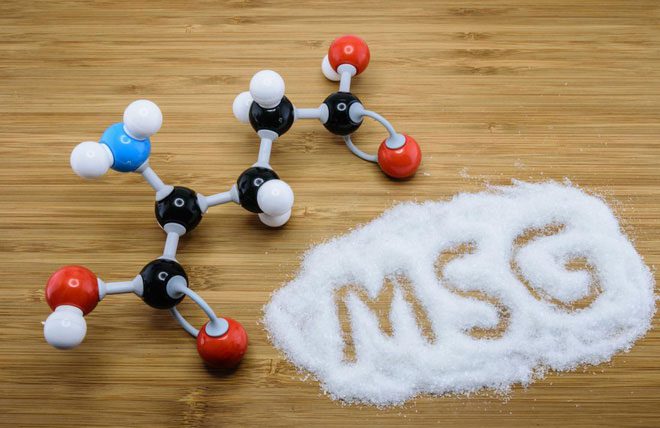Generally, mild symptoms can resolve on their own.
Some individuals may experience a sensation of sickness after consuming foods high in monosodium glutamate (MSG). This is a fairly common syndrome for those sensitive to MSG, causing one or more symptoms that include: thirst, mouth burning, headaches, sweating, rapid heartbeat, dizziness, nausea, weakness in limbs, difficulty breathing, chest tightness…
The MSG syndrome can last from a few minutes to several hours, with some individuals experiencing severe symptoms for days. However, scientists generally regard MSG as safe. It is permitted for use without dosage restrictions by the United States Food and Drug Administration (FDA).
If you are sensitive to MSG, the best way to avoid MSG sickness is to eliminate it from your diet. Nonetheless, most foods today contain some level of MSG. Sausages, canned foods, and potato chips often have added MSG for flavor enhancement.
Moreover, when dining out, many establishments tend to use a considerable amount of MSG or seasoning powders containing MSG in their dishes to cater to the taste preferences of the majority of diners. So, are there any tips to avoid MSG sickness if you are sensitive to it?
According to Jane Leonard, a doctor in London, drinking plenty of water or taking pain relievers can help alleviate feelings of MSG sickness. However, there are also two highly effective remedies that many people are unaware of: ginger tea and peppermint tea.

Ginger and mint tea can help reduce symptoms of MSG sickness.
MSG Syndrome
MSG is a form of glutamic acid, which is naturally present in various foods including cheese, meat, fish, mushrooms, tomatoes, and walnuts. In fact, the human body contains up to 2 kg of natural MSG.
Nonetheless, MSG used as a flavor enhancer in foods can cause discomfort for some individuals.
Current science does not fully understand why MSG can cause some people to feel ill while others do not. Even individuals who generally believe they are sensitive to MSG may sometimes not react when consuming foods without knowledge of MSG being present.
A study conducted by Yeonsung University and Kyung Hee University in South Korea, published in 2014, compiled the discomforting symptoms reported by individuals after consuming MSG. According to the study, the most common sensations they experienced included thirst, drowsiness, weakness in limbs, headaches, and a feeling of nausea similar to being sick.
“Some people experience symptoms such as headaches and sweating after eating at Chinese restaurants [which often use a lot of MSG],” Dr. Leonard noted. “The medical community has previously referred to this symptom cluster as Chinese restaurant syndrome. Today, doctors call it MSG symptom complex.”
Dr. Leonard further explained that scientific research on MSG sickness is still quite limited. In contrast, anecdotal reports or narratives about it are numerous. This is because MSG sickness is usually not severe and can resolve on its own before individuals even require medical assistance.
One notable case of MSG sickness reported in 2017 in the Indian Journal of Critical Care Medicine involved a 23-year-old man from Mahad in northern India, who reportedly lost his voice and the ability to swallow after consuming MSG.
This young man arrived at the hospital speaking with difficulty and unable to swallow saliva. Doctors observed that his mouth was swollen, attributing it to the consumption of fried rice containing MSG the night before.
The young man complained of dizziness, sweating, and itching all over his body afterward. However, after arriving at the hospital and receiving treatment, he quickly recovered.

MSG is a form of glutamic acid, and even the human body contains 2kg of natural MSG.
Try Drinking Ginger or Peppermint Tea
Dr. Leonard suggests that if individuals notice mild symptoms of MSG sickness, they should drink peppermint or ginger tea.
Ginger tea helps reduce feelings of nausea. It is often used to alleviate morning sickness in pregnant women and side effects in chemotherapy patients.
Scientists are also uncertain why ginger tea can soothe the stomach and reduce nausea. It is hypothesized that ginger contains a component that helps control serotonin levels in the brain—linked to feelings of vomiting—or it may reduce inflammation in the intestines.
Meanwhile, peppermint tea is believed to aid in fat breakdown in the digestive system, thereby reducing nausea.
Additionally, Dr. Leonard states that individuals experiencing MSG sickness should drink water to keep their bodies hydrated. If headaches are severe, they should rest and take pain relief medication. Medical assistance is necessary when symptoms worsen, such as difficulty breathing, chest tightness, or systemic allergic reactions.
Preventing Headaches from MSG Consumption
If you are allergic to MSG, the only way to prevent symptoms is to eliminate foods containing MSG. Alternatively, you may try a small amount to observe your body’s reaction.
Those allergic to MSG should also be cautious when selecting processed foods such as packaged meats and processed products (like sausages), potato chips, soups, and sauces, as these foods often contain significant amounts of MSG.
Individuals particularly sensitive to MSG may also need to avoid foods high in naturally occurring glutamate, such as cheese, cured meats, bone broth, fish and shellfish, fish sauce and oyster sauce, soy protein, soy sauce, mushrooms, ripe tomatoes and tomato juice, grape juice, malted barley, and walnuts.
However, you do not necessarily have to completely avoid glutamate-rich foods; they can be consumed in moderation.
Overall, there remains much debate about whether MSG is harmful to health, but symptoms like headaches after consuming MSG do occur and many people experience them. Although not severe, MSG sickness symptoms can be uncomfortable. Therefore, those sensitive to MSG may consider eliminating this seasoning from their diet.



















































